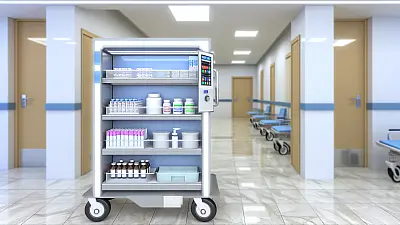YERINGTON, NV - Federal inspectors cited South Lyon Medical Center for multiple deficiencies in its infection control and prevention policies during a July 2024 survey, finding that critical safety protocols were outdated, incomplete, and potentially ineffective at protecting residents from communicable diseases.

Outdated Infection Control Framework Creates Safety Gaps
The facility's infection control and prevention plan (IPCP) contained fundamental flaws that could compromise resident safety and regulatory compliance. Inspectors discovered the policy had not been reviewed or updated since October 2022, leaving it nearly two years out of date at the time of the survey.
More concerning, the facility's IPCP appeared to be designed for a hospital setting rather than a long-term care environment. The policy referenced "the hospital's IPCP" and outlined duties for hospital staff without clearly indicating how these protocols applied to the nursing home's specific needs and resident population.
This misalignment represents a significant oversight in infection control planning. Long-term care facilities face unique challenges compared to hospitals, including residents with compromised immune systems who live in close quarters for extended periods. These vulnerable populations require specialized infection prevention strategies that account for their prolonged exposure risks and often multiple chronic conditions.
Missing Disease Reporting and Employee Health Protocols
The inspection revealed critical gaps in the facility's approach to managing communicable diseases. The IPCP lacked a comprehensive list of reportable communicable diseases and failed to establish clear procedures for notifying appropriate state health agencies when such diseases occurred among residents or staff.
This absence of reporting protocols could delay public health responses to disease outbreaks and prevent proper contact tracing. State health departments rely on timely notifications from healthcare facilities to monitor disease patterns, implement containment measures, and protect the broader community from potential exposure.
Equally problematic, the facility's policy contained no provisions prohibiting employees with communicable diseases or infected skin lesions from having direct contact with residents or their food. This oversight could allow infected staff members to unknowingly transmit diseases to vulnerable residents through routine care activities or food service.
Medical standards require healthcare facilities to implement clear guidelines for when employees should be excluded from work due to illness. These protocols typically include specific criteria for common conditions like influenza, gastrointestinal infections, and skin conditions that could pose transmission risks.
Communication Breakdowns During Care Transitions
The inspection identified significant deficiencies in how the facility manages information during resident transfers to other healthcare providers. The IPCP failed to establish processes for communicating critical medical information, including current diagnoses, active infections, multi-drug resistant organism status, and necessary precautions.
This communication gap becomes particularly dangerous when residents require emergency care or specialized treatment at hospitals. Receiving facilities need comprehensive information about a resident's infection status and any transmission-based precautions to protect their staff and other patients while providing appropriate care.
The facility also lacked procedures for ensuring receipt of important medical information when residents returned from acute care hospitals or other facilities. This bidirectional communication failure could result in missed diagnoses, discontinued treatments, or inadequate infection control measures upon readmission.
Effective care coordination requires detailed documentation of any infections acquired during external care, changes in antibiotic resistance patterns, new medical conditions, and updated treatment plans. Without these protocols, residents face increased risks of medication errors, treatment interruptions, and exposure to preventable infections.
Broken Links and Inaccessible Resources
Inspectors found that the facility's supplementary policy on nationally notifiable diseases contained outdated and non-functional web links. The policy referenced links from 2020 that were no longer active, potentially leaving staff without access to current disease reporting requirements.
While the policy did include one functional link in its reference section, this inconsistency demonstrates poor policy maintenance and could create confusion among staff about which resources to use for disease reporting guidance. Healthcare facilities must maintain current, accessible references to ensure staff can quickly identify reportable conditions and follow proper notification procedures.
The outdated links also suggest broader issues with policy review and maintenance processes. Regular policy updates are essential in healthcare settings, particularly for infection control protocols that must reflect evolving disease threats, changing regulatory requirements, and updated clinical guidelines.
Additional Issues Identified
Beyond the major policy deficiencies, the inspection revealed systematic problems with the facility's infection control program management. The Director of Nursing confirmed during the survey that the inadequate IPCP was indeed the policy currently in use by the facility, acknowledging the missing elements identified by inspectors.
The violations were classified as having minimal harm with potential for actual harm, affecting few residents. However, the broad nature of these policy deficiencies suggests systemic issues that could impact the facility's ability to respond effectively to future infection control challenges.
These findings highlight the critical importance of maintaining current, comprehensive infection control policies in long-term care settings. Facilities must regularly review and update their protocols to reflect current medical standards, regulatory requirements, and the specific needs of their resident populations.
The inspection underscores how seemingly administrative deficiencies in policy documentation can have real-world implications for resident safety and public health protection. Effective infection control requires not just proper clinical practices, but also robust systems for disease surveillance, reporting, and care coordination across different healthcare settings.
Full Inspection Report
The details above represent a summary of key findings. View the complete inspection report for South Lyon Medical Center from 2024-07-23 including all violations, facility responses, and corrective action plans.
💬 Join the Discussion
Comments are moderated. Please keep discussions respectful and relevant to nursing home care quality.